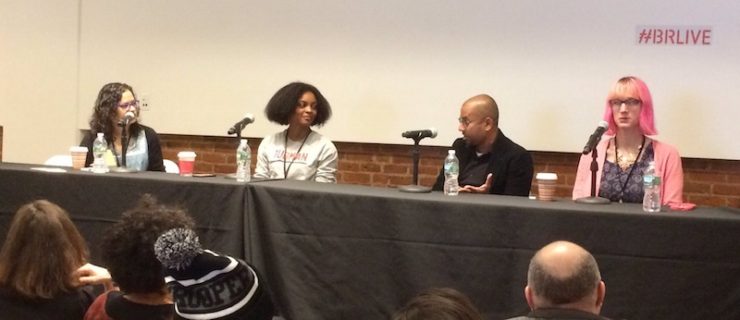There were several moments of levity during the Hello From Another Side panel at Book Riot Live this past weekend, when the panelists made sure to clarify that they were not the characters they write—elicting laughter at the reminder that a black woman is not a gay Korean man, that an Indian man is not a rich Latina Millennial. Which is not to say that the panel was a grave one: Charlie Jane Anders, Alyssa Cole, and Rumaan Alam spoke engagingly about building stories around characters and identifying their own blind spots, with self-deprecation just one aspect of the self-aware discussion.
Character or Concept?
Moderator Rachel Fershleiser (executive director of audience development and community engagement at Houghton Mifflin Harcourt) kicked off the panel with a question that doubtless most writers wrestle with: When you have ideas for books or stories, do you begin with character or with a place or concept?
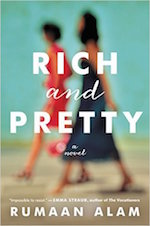 “Place and scene are very important, obviously, in a book,” Alam answered, “but people are the way I understand. I like to give them names and create a sense of biography that has little to do with the [final] work.” In fact, when writing Rich and Pretty—about two women whose decades-long friendship begins to fray in their early thirties—he went for the most anonymous names possible for his protagonists Sarah and Lauren, pulling from the most popular baby girl names in the year they were born.
“Place and scene are very important, obviously, in a book,” Alam answered, “but people are the way I understand. I like to give them names and create a sense of biography that has little to do with the [final] work.” In fact, when writing Rich and Pretty—about two women whose decades-long friendship begins to fray in their early thirties—he went for the most anonymous names possible for his protagonists Sarah and Lauren, pulling from the most popular baby girl names in the year they were born.
Anders also delved into her protagonists’ childhoods for All the Birds in the Sky, but her method had more of an ulterior motive. Every story of hers is different, she explained: “Sometimes I start with a cool idea and I have to figure out how to make it personal and who to hang it on”—in this case, a witch and a mad scientist whose paths cross in adolescence and then later in adulthood. “I can’t get too far unless I have characters I’m obsessed with,” but it’s not always the first thing. By following Patricia and Laurence from a young age, “I wanted to keep coming back to characters and not get distracted by shiny things too much” such as time machines, talking animals, and other plot devices.
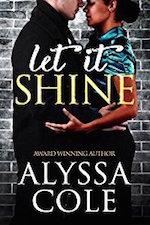 “Romance is a great carrier genre for writing whatever you want,” Cole said. “You can put the issues in there, but it’s really focused on the characters.” Cole would know, having done exactly that in sci-fi (her post-apocalyptic Off the Grid trilogy, which concluded last year with Mixed Signals), historical (Let It Shine), and contemporary romance. “For it to be good, you can’t cut any corners, because the reader has to be very invested in whether they’re gonna have a happy ending or ‘happy for now.’”
“Romance is a great carrier genre for writing whatever you want,” Cole said. “You can put the issues in there, but it’s really focused on the characters.” Cole would know, having done exactly that in sci-fi (her post-apocalyptic Off the Grid trilogy, which concluded last year with Mixed Signals), historical (Let It Shine), and contemporary romance. “For it to be good, you can’t cut any corners, because the reader has to be very invested in whether they’re gonna have a happy ending or ‘happy for now.’”
There is, of course, the constraint of history itself; Cole pointed out that you can’t change the bad things that have happened in the past, unless you write an alternate history. Though Fershleiser countered with the question of whether writing historical romance is a way of putting hope into the past. Cole agreed that she’ll often get ideas from reading cool, little-known history and picking up factoids—although “with a lot of marginalized groups, a lot of history is little-known.”
Genre and Blind Spots
Each of the panelists experiments with genre, from Anders merging magic and sci-fi to Alam writing literary fiction that got marketed as chick lit, and Cole writing cross-genre. Anders admitted that it can be difficult to stick to character when writing something explicitly genre, especially when one is trying to create the domino-effect of a number of plot points occurring in a specific order. However, she also pointed out, the same pitfalls can happen with writing literary fiction and following a similar order of events that must happen.
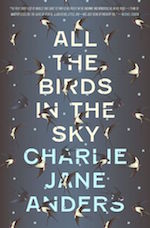 All agreed that tropes are an important tool for playing with genre expectations, as you can set up a particular familiar trope and then change them in a way that’s fresh and exciting for readers. Tropes “can help, can hurt,” Anders said, as they can be “a way of focusing your intentions in the story” but might also lead a writer astray by binding them to the often outdated, cliché, or downright offensive depictions of certain characters that genre. These blind spots occur when writers fall back on their knowledge of a movie for a certain character’s background rather than doing independent research into the personal histories and experiences of people other than the writer. “You should stop and educate yourself,” she said; if instead you think, in this kind of story, this always happens, “that’s death—that’s death of storytelling.”
All agreed that tropes are an important tool for playing with genre expectations, as you can set up a particular familiar trope and then change them in a way that’s fresh and exciting for readers. Tropes “can help, can hurt,” Anders said, as they can be “a way of focusing your intentions in the story” but might also lead a writer astray by binding them to the often outdated, cliché, or downright offensive depictions of certain characters that genre. These blind spots occur when writers fall back on their knowledge of a movie for a certain character’s background rather than doing independent research into the personal histories and experiences of people other than the writer. “You should stop and educate yourself,” she said; if instead you think, in this kind of story, this always happens, “that’s death—that’s death of storytelling.”
When asked how to recognize when you’re in a blind spot, the panelists all shared their experiences and key pieces of advice:
- Get beta readers and sensitivity readers who are familiar with the backgrounds of the characters you’re trying to write. “If you know you have a blind spot, you can even think that you’ve overcome a lot of the blind spot, but you haven’t,” Cole said. “The bottom line is, always have beta readers, but especially make sure you have beta readers from the particular group you’re writing about—if it’s not aliens or something.”
- Have more than one sensitivity reader if possible. Cole found that in writing a suffragette novella set in 1917, with a main character from India, that two of her readers were from different regions of India and had different experiences; not necessarily contradictory, but enough that it provided more nuance to her work. And compensate them for their time!
- “You also have to do a gut check 100 times,” Anders said—put the piece aside for a month, then return to it with a fresh perspective.
- “It’s OK to get it wrong,” Alam said. Sometimes you can work the lack of understanding into the book by putting that perspective into the mouths of your characters; that can be just as valuable.
Hello From Another Side
Aside from getting Adele stuck in your head all day, the name of the panel actually sums up the fascinating amount of empathy that arises from writing other people’s experiences. Alam found that it was more difficult to write Sarah, who becomes a stay-at-home mom by the end of the book, despite her arc more closely resembling his life. Writing about how she felt about her circumscribed existence—growing up in privilege and inheriting the same future as her socialite mother—was harder for him than it was to inhabit the headspace of Lauren, who barely scrapes by at her publishing job and has absolutely no idea what her future holds.
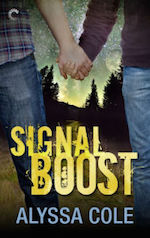 Signal Boost, the second book in Cole’s Off the Grid trilogy, continued the first-person narration from the first installment, but its hero was a gay Korean man. “I was more worried about not capturing the nuance of the character,” she said. “But actually in the end, strangely he’s the character I most associate with from all of my characters.”
Signal Boost, the second book in Cole’s Off the Grid trilogy, continued the first-person narration from the first installment, but its hero was a gay Korean man. “I was more worried about not capturing the nuance of the character,” she said. “But actually in the end, strangely he’s the character I most associate with from all of my characters.”
It’s liberating to write a character who’s not like you, Alam added, “because you can stuff yourself into them and nobody can tell.”
Top photo via @vocabswag on Twitter










